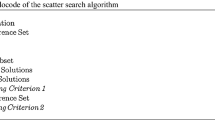Abstract
The Flow-Shop Scheduling Problem (FSSP) is one of the most famous scheduling problems. The Flow-Shop scheduling problem is a disjunctive problem, meaning that a solution is fully described by an oriented disjunctive graph where the earliest starting times are computed with a longest path algorithm. We propose a new approach based on Quantum Approximate Optimization Algorithm (QAOA) to find high quality solutions to FSSP instances using a vector representation. This approach permits to solve the well-known Carlier’s instances with 64 operations to schedule. All the experiments have been achieved using the Qiskit library and carried on the IBM simulator. Presently, quantum methods cannot compete with classical ones because we lack quantum computers capable of solving large instances, and we have yet to figure out how to integrate the vast body of research results accumulated in flow-shop resolution over the last few decades into quantum algorithms. The ability of quantum approaches to effectively solve optimization problems in the future depends both on technical advancements in quantum machines and on the capacity to incorporate theoretical findings from scheduling into quantum optimization strategies.
Access this chapter
Tax calculation will be finalised at checkout
Purchases are for personal use only
Similar content being viewed by others
References
Garey, M.R., Johnson, D.S., Seth, R.: The complexity of flowshop and jobshop scheduling. Math. Oper. Res. 1, 117–129 (1976)
Roy, B., Sussmann, B.: Les problèmes d’ordonnancement avec contraintes disjunctives. In: Note DS N°9 bis. SEMA, Paris (1964)
Cheng, A., Gen, M., Tsumjimura, Y.: A tutorial survey of job-shop scheduling problems using genetic algorithms – representations. Comput. Ind. Eng. 30(4), 983–997 (1996)
Bourreau, E., Fleury, G., Lacomme, P.: Indirect quantum approximate optimization algorithms: application to the TSP (2023). arXiv:2311.03294
Knuth, D.: The Art of Computer Programming - Volume 3. Sorting and Searching. 2nd edn. Addison-Wesley, Reading (1981)
Laisant, C.A.: Sur la numération factorielle, application aux permutations. Bull. de la S.M.F. tome 16, 176–173 (1888)
Mantaci, R., Rakotondrajao, F.: A permutation representation that knows what Eulerian means. Discrete Math. Theor. Comput. Sci. 4, 101–108 (2001)
Hadfield, S.: Quantum algorithms for scientific computing and approximate optimization. Submitted in partial fulfillment of the requirements for the degree of doctor of Philosophy in the Graduate School of Arts and Sciences. Columbia University (2018)
Chassaing, M., Fontanel, J., Lacomme, P., Ren, L., Tchernev, N., Villechenon, P.: A GRASP×ELS approach for the job-shop with a web service paradigm packaging. Expert Syst. Appl. 41(2), 544–562 (2014)
Anunay, F.A., Pandey, A., Kumar, S.K.: Mathematical models for multi-stage hybrid assembly flow-shop scheduling with preventive maintenance and release times. Comput. Ind. Eng. 186, 109719 (2023)
Khatami, M., Salehipour, A., Cheng, T.C.E.: Flow-shop scheduling with exact delays to minimize makespan. Comput. Ind. Eng. 183, 109456 (2023)
Geng, X.-N., Sun, X., Wang, J., Pan, L.: Scheduling on proportionate flow shop with job rejection and common due date assignment. Comput. Ind. Eng. 181, 109317 (2023)
Mraihi, T., Driss, O.B., EL-Haouzi, H.B.: Distributed permutation flow shop scheduling problem with worker flexibility: review, trends and model proposition. Expert Syst. Appl. 238, 121947 (2023)
Neufeld, J.S., Schulz, S., Buscher, U.: A systematic review of multi-objective hybrid flow shop scheduling. Eur. J. Oper. Res. 309, 1–23 (2023)
Yenisey, M.M., Yagmahan, B.: Multi-objective permutation flow shop scheduling problem: literature review, classification and current trends. Omega 45, 119–135 (2014)
Carlier, J.: Ordonnancements à contraintes disjonctives. RAIRO. Recherche opérationnelle. 12(4), 333–350 (1978)
Ren, J., Ye, C., Yang, F.: Solving flow-shop scheduling problem with a reinforcement learning algorithm that generalizes the value function with neural network. Alex. Eng. J. 60, 2787–2800 (2021)
Venturelli, D., Marchand, D.J.J., Rojo, G.: Quantum annealing implementation of job-shop scheduling (2016). arXiv:1506.08479v2
Carugno, C., Dacrema, M.F., Cremonesi, P.: Evaluating the job shop scheduling problem on a D-wave quantum annealer. Sci. Rep. 12, 6539 (2022)
Schworm, P., Wu, X., Glatt, M., Aurich, J.C.: Solving fexible job shop scheduling problems in manufacturing with Quantum Annealing. Prod. Eng. Res. Devel. 17, 105–115 (2023)
Kurowski, K., Pecynaa, T., Slysz, M., Rózycki, R., Waligóra, G., Weglarz, J.: Application of quantum approximate optimization algorithm to job shop scheduling problem. Eur. J. Oper. Res. 310(2), 518–528 (2023)
Wilson, J.M.: Alternative formulations of a flow-shop scheduling problem. J. Opl. Res. Soc. 40(4), 395–399 (1989)
Seda, M.: Mathematical models of flow-shop and job-shop scheduling problems. World Academy of Science, Engineering and Technology. 31 (2007)
Manne, A.S.: On the job-shop scheduling problem. Oper. Res. 8, 219–223 (1960)
Wagner, H.M.: An integer linear-programming model for machine scheduling. Nav. Res. Logist. Q. 6(2), 131–140 (1959)
Feo, T.A., Resende, M.G.C.: Greedy adaptative search procedures. J. Glob. Optim. 6(2), 109–133 (1995)
Wolf, S., Merz, P.: Evolutionary local search for the super-peer selection problem and the p-hub median problem. In: Bartz-Beielstein, T., et al. (eds.) HM 2007. LNCS, vol. 4771, pp. 1–15. Springer, Heidelberg (2007). https://doi.org/10.1007/978-3-540-75514-2_1
Author information
Authors and Affiliations
Corresponding author
Editor information
Editors and Affiliations
Rights and permissions
Copyright information
© 2024 The Author(s), under exclusive license to Springer Nature Switzerland AG
About this paper
Cite this paper
Fleury, G., Lacomme, P., Prodhon, C. (2024). Indirect Flow-Shop Coding Using Rank: Application to Indirect QAOA. In: Sevaux, M., Olteanu, AL., Pardo, E.G., Sifaleras, A., Makboul, S. (eds) Metaheuristics. MIC 2024. Lecture Notes in Computer Science, vol 14753 . Springer, Cham. https://doi.org/10.1007/978-3-031-62912-9_21
Download citation
DOI: https://doi.org/10.1007/978-3-031-62912-9_21
Published:
Publisher Name: Springer, Cham
Print ISBN: 978-3-031-62911-2
Online ISBN: 978-3-031-62912-9
eBook Packages: Computer ScienceComputer Science (R0)




